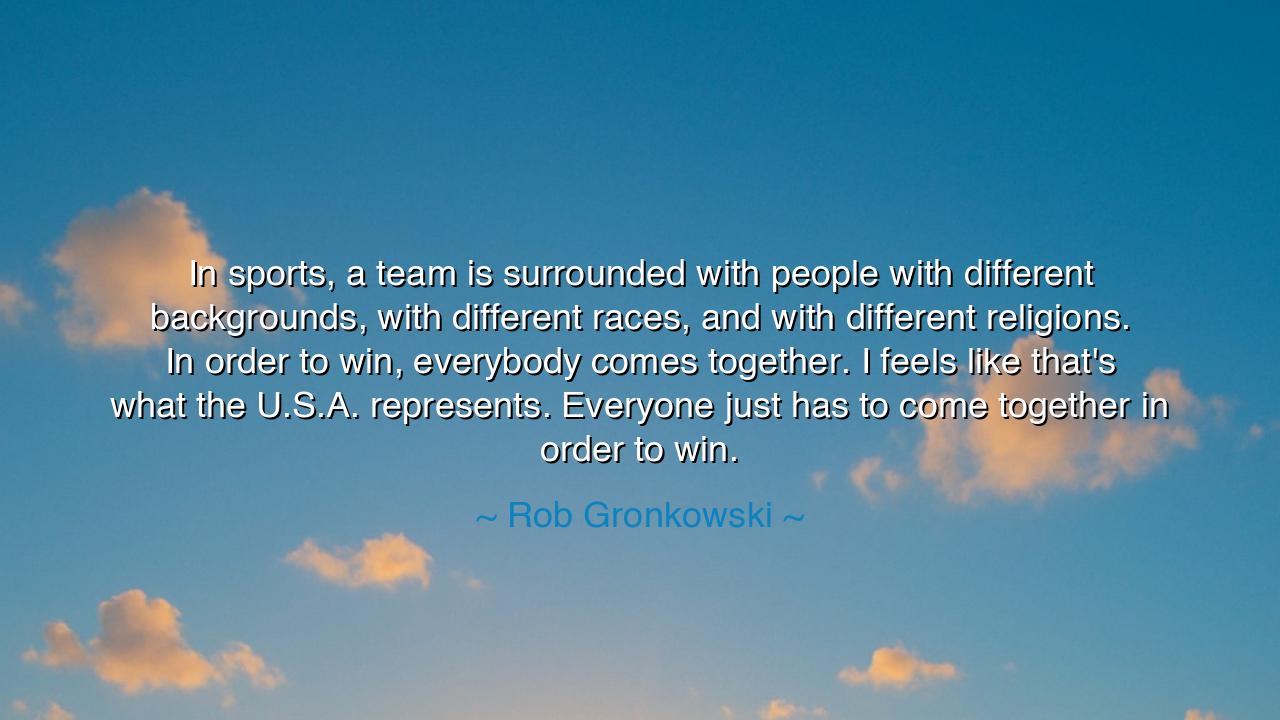
In sports, a team is surrounded with people with different
In sports, a team is surrounded with people with different backgrounds, with different races, and with different religions. In order to win, everybody comes together. I feels like that's what the U.S.A. represents. Everyone just has to come together in order to win.






Rob Gronkowski, with the simplicity of an athlete yet the depth of a philosopher, once declared: “In sports, a team is surrounded with people with different backgrounds, with different races, and with different religions. In order to win, everybody comes together. I feel like that’s what the U.S.A. represents. Everyone just has to come together in order to win.” These words, though born in the arena of the game, reach far beyond it — to the very fabric of nations and the destiny of peoples.
At the heart of this saying lies the nature of the team. In sports, victory is never claimed by one alone, no matter how great the champion. A quarterback without a line is defenseless, a striker without teammates cannot score, a runner without coaches will falter. The diversity of gifts is necessary, and only when each contributes with humility and discipline does the team rise to triumph. Thus, Gronkowski’s vision begins not with abstract ideals but with the living reality of sport — the blending of many into one.
When he speaks of different backgrounds, races, and religions, he reminds us that unity is not sameness. A team is not strong because all are alike, but because their differences become strengths woven together. Just as a symphony is not made of a single note, but of many instruments sounding in harmony, so too a great team — and a great nation — finds power in the joining of diverse souls. To win, not some, but all must join together.
History has proven this truth in moments of crisis. During World War II, the United States gathered men and women from every corner of the land, of every faith and ancestry, to work in unison for survival. In factories, fields, and battlefields, unity brought victory. In a different way, the Civil Rights Movement revealed the same principle: people of different colors and creeds marching together for justice. Victory did not belong to one group alone, but to the unity of all who stood as one.
Gronkowski’s comparison to the U.S.A. speaks to the founding vision of the nation itself — “E Pluribus Unum,” out of many, one. The country was built not as a single tribe, but as a gathering of many, bound by a shared purpose. Like a team, it falters when divided, but triumphs when every part, no matter how small, joins its strength to the whole. His words remind us that patriotism is not mere pride in symbols, but active unity in pursuit of common goals.
The lesson is clear: whether in sports or in life, division leads to defeat, but unity leads to triumph. Families, communities, and nations must learn this wisdom: that the path to victory is paved with cooperation, humility, and respect for the gifts of others. No one wins alone, and no nation survives divided.
Practical action follows naturally. On the field, honor your teammates, for their strength is your own. In the workplace, recognize the value of diversity, for different perspectives forge stronger solutions. In the nation, seek common ground rather than enmity, for unity is not the denial of difference but its transformation into collective strength.
Thus, Rob Gronkowski’s words are more than the reflection of an athlete; they are the echo of an eternal truth: in order to win, everybody must come together. Children of tomorrow, take this teaching to heart — for whether in the stadium of sport or the greater stadium of life, only unity brings victory, and only together can humanity rise.






AAdministratorAdministrator
Welcome, honored guests. Please leave a comment, we will respond soon